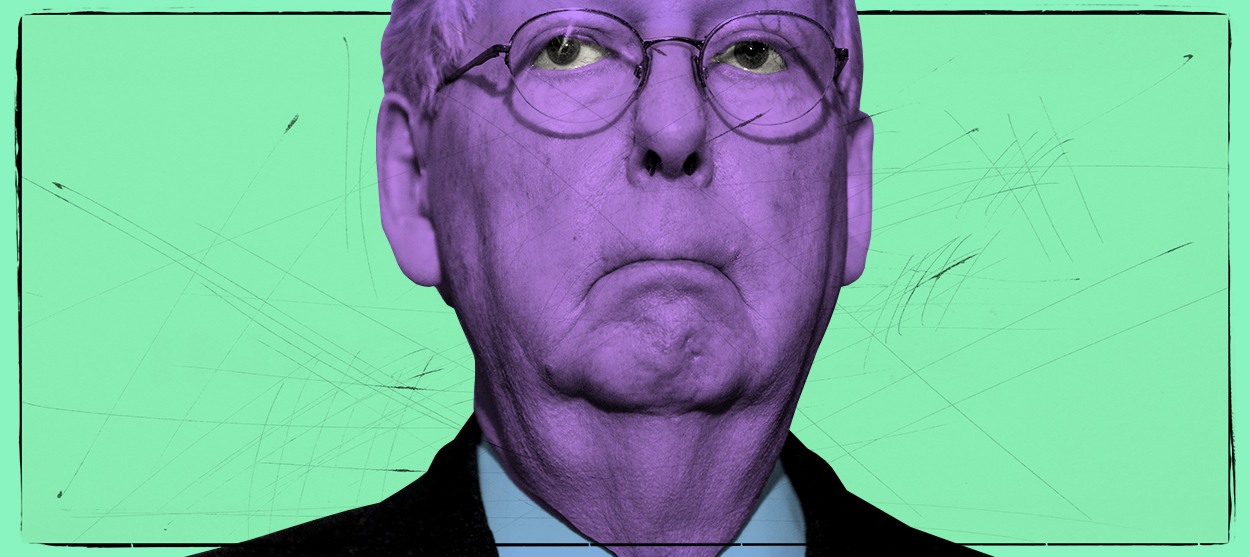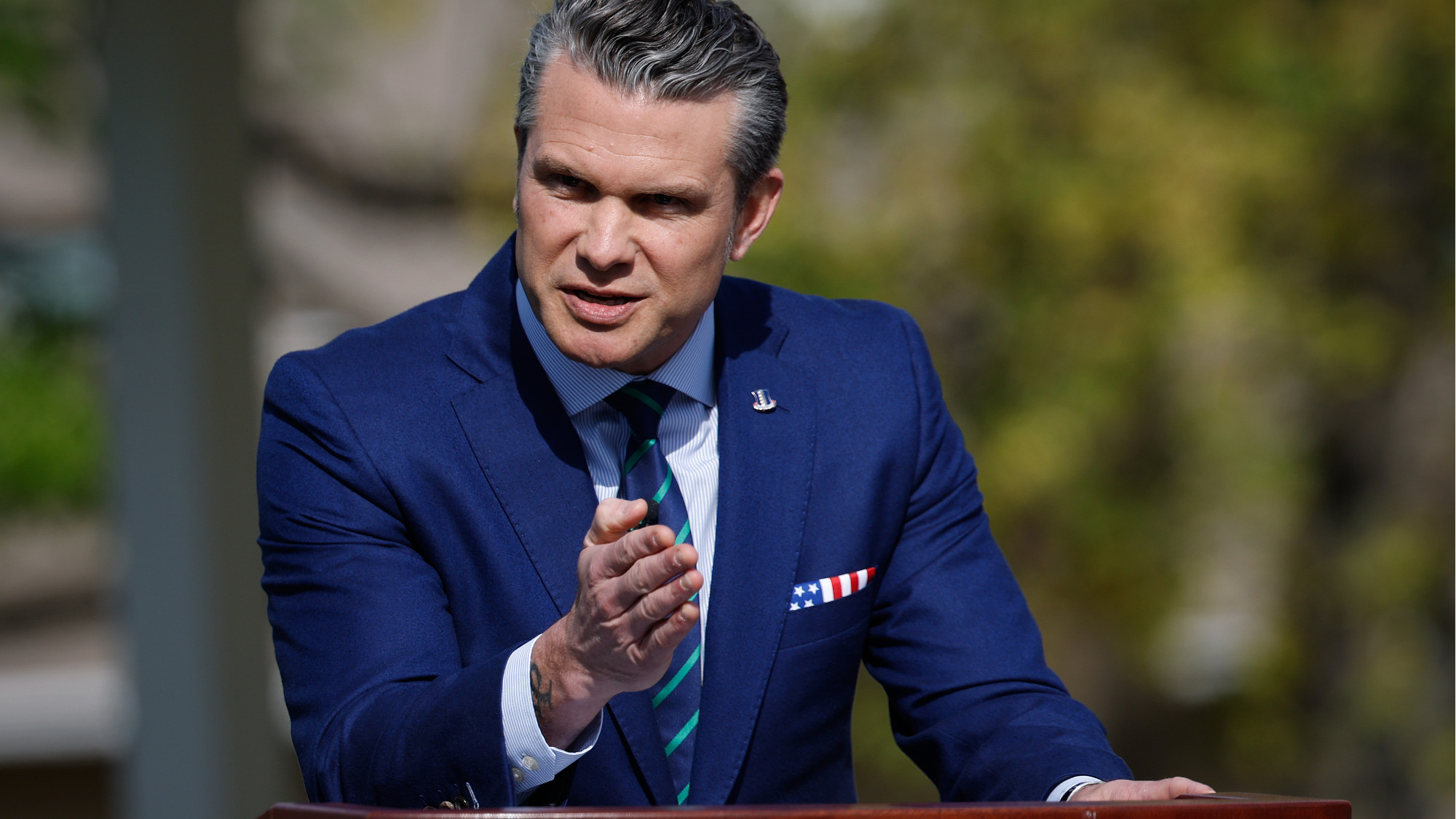Mitch McConnell is aiding and abetting the spread of coronavirus
Republican stonewalling of a legislative response will get people killed


A free daily email with the biggest news stories of the day – and the best features from TheWeek.com
You are now subscribed
Your newsletter sign-up was successful
The outbreak of coronavirus has become a full-blown epidemic in the United States. The NBA has suspended its season after Utah Jazz player Rudy Gobert came down with the disease (after scoffing at disease precautions, and possibly infecting many others as a result). President Trump may have it. Stock markets around the world are plummeting.
A financial crisis looks very possibly in the offing, as well as a recession. So like some arthritic, emaciated polar bear coming out of hibernation, the American federal government is finally starting to respond, sort of. House Democrats have announced a major coronavirus bill, which includes "paid sick leave, widespread free testing, food aid, and unemployment insurance," Politico reports. It would also increase federal funding of Medicaid to ease burdens on states.
Naturally, Senate Majority Leader Mitch McConnell immediately announced his opposition, as did House Minority Leader Kevin McCarthy. On Twitter McConnell complained that the bill "wanders into policy areas that are not related to the pressing issues at hand."
The Week
Escape your echo chamber. Get the facts behind the news, plus analysis from multiple perspectives.

Sign up for The Week's Free Newsletters
From our morning news briefing to a weekly Good News Newsletter, get the best of The Week delivered directly to your inbox.
From our morning news briefing to a weekly Good News Newsletter, get the best of The Week delivered directly to your inbox.
These men, and the rest of the Republican congressional caucus, are aiding and abetting the coronavirus epidemic.
It's probably fair to conclude that the national-level American response to novel coronavirus outbreak has been the worst in the developed world by a considerable margin. When I first read that Italy had a major outbreak, I unfairly assumed it was due to mistakes and disorganization on their part. But it turns out this was not true at all. Italy responded quite quickly and aggressively — shutting down travel from China, rapidly expanding their testing, deploying medical personnel, and putting whole cities on lockdown.
Nevertheless, their initial efforts were still short of what was needed to contain the virus — and that makes all the difference. East Asian countries like Singapore, Vietnam, and Taiwan had experience fighting off the SARS and swine flu outbreaks years ago, and learned that to actually stop an outbreak before it becomes an epidemic, you need total commitment and perfect performance from the jump. Indeed, it seems South Korea had a major outbreak solely because of a single unlucky break — a "super-spreader" event where one person infected dozens of others in a few hours.
So Italy was just a bit behind the curve, and as a result is suffering a shattering epidemic. Deaths rose on Wednesday alone by 30 percent, to over 800. It will probably get much worse before it gets better. But now the Italian government has followed China's lead and basically shut down most of the country. All Italian residents are on lockdown, schools are closed, events are canceled, and national travel is sharply limited. All businesses except food stores and pharmacies are closed, and people in public are required to stand at least 3 feet away from each other at all times. The rest of Europe will probably be following in their footsteps very soon.
A free daily email with the biggest news stories of the day – and the best features from TheWeek.com
As China demonstrates, tactics like these are what you need to contain an epidemic once it has gotten started. If people do not come in contact with each other, the virus cannot be transmitted, and it will eventually burn itself out in a few months. However, that obviously causes major problems for people under lockdown. People need food and income to survive. If ordinary society all but grinds to a halt, the government must step in to keep people from starving while they are stuck at home. That's why Italy has also drastically stepped up social services, including a suspension of home mortgage payments.
So in the first instance, McConnell is lying about the Democratic bill. Every single one of the stipulations is directly related to the coronavirus epidemic. Americans need sick leave so they aren't forced to go to work and end up infecting others. People who get fired need unemployment insurance so they don't get evicted or starve. And most of all, the United States needs to drastically ramp up its testing.
At time of writing, the Centers for Disease Control reported that only about 11,000 tests had been performed in total — as compared to nearly 20,000 per day in South Korea, which has only about 15 percent of the U.S. population. Without testing, one can't even know where the virus is spreading, making it nearly impossible to coordinate an effective response. Theoretical U.S. testing capacity has been hurriedly expanded to over 18,500 per day, but lack of cooperation from the federal government has snarled things up at every level. Washington state officials waited for weeks for approval from Trump administration officials to test, only to go ahead anyway and find an epidemic already in progress. Private laboratories report severe delays in tests due to a "demanding government approval process." Meanwhile, the White House's repeated claims that insurance providers have agreed to waive out-of-pocket costs for testing have hardly been convincing to Americans terrified of receiving surprise medical bills for thousands of dollars, much less the nearly 30 million who don't have any insurance at all.
The obvious solution is for the federal government to just pony up the cash. Set a reasonable price for a test, pass legislation that says the government will foot the bill, and demand all laboratories charge ahead at the greatest possible speed. Indeed, if anything the Democratic bill is not nearly aggressive enough. The government should fund all sick leave, not just for employers with under 50 employees (larger ones are mandated to provide it themselves in the Democratic plan). All uninsured and underinsured people should be placed on Medicare for the duration of the epidemic at least. In addition to funding all testing and quarantine measures, the government should fund immediate construction of as many new ventilators and oxygenation machines as possible. States and local governments should be encouraged to ban all large public events and, together with the national government, immediately start a public education campaign encouraging people to avoid social contact.
All this should have been done in January. Given the rattletrap American health care system — which is far, far worse than Italy's — even that would probably not be sufficient. But it at least would be a start.
And again, this is a moderate proposal. Indeed, there's a good argument that Democrats should use their leverage over Trump — who is desperate to get something passed and have it look like he’s managing the situation — to make a lot of these measures permanent, or at least force Republicans to reciprocate the next time something like this comes up. The fact that they largely aren't undercuts any notion that Democrats are asking for the moon.
Instead, Republicans will reportedly not do anything until next week at the earliest, and even then they say they will only act on economic questions — presumably including massive giveaways to fossil fuel companies and other corporate allies. With new cases reported every day growing exponentially, this sort of delay is unfathomably irresponsible. It will kill thousands of people, without question.
Conservatism nearly destroyed the United States between 1929 and 1932. Republicans today seem bound and determined to beat Herbert Hoover's record of failure.
Want more essential commentary and analysis like this delivered straight to your inbox? Sign up for The Week's "Today's best articles" newsletter here.
Ryan Cooper is a national correspondent at TheWeek.com. His work has appeared in the Washington Monthly, The New Republic, and the Washington Post.
-
 The Olympic timekeepers keeping the Games on track
The Olympic timekeepers keeping the Games on trackUnder the Radar Swiss watchmaking giant Omega has been at the finish line of every Olympic Games for nearly 100 years
-
 Will increasing tensions with Iran boil over into war?
Will increasing tensions with Iran boil over into war?Today’s Big Question President Donald Trump has recently been threatening the country
-
 Corruption: The spy sheikh and the president
Corruption: The spy sheikh and the presidentFeature Trump is at the center of another scandal
-
 The billionaires’ wealth tax: a catastrophe for California?
The billionaires’ wealth tax: a catastrophe for California?Talking Point Peter Thiel and Larry Page preparing to change state residency
-
 Bari Weiss’ ‘60 Minutes’ scandal is about more than one report
Bari Weiss’ ‘60 Minutes’ scandal is about more than one reportIN THE SPOTLIGHT By blocking an approved segment on a controversial prison holding US deportees in El Salvador, the editor-in-chief of CBS News has become the main story
-
 Has Zohran Mamdani shown the Democrats how to win again?
Has Zohran Mamdani shown the Democrats how to win again?Today’s Big Question New York City mayoral election touted as victory for left-wing populists but moderate centrist wins elsewhere present more complex path for Democratic Party
-
 Millions turn out for anti-Trump ‘No Kings’ rallies
Millions turn out for anti-Trump ‘No Kings’ ralliesSpeed Read An estimated 7 million people participated, 2 million more than at the first ‘No Kings’ protest in June
-
 Ghislaine Maxwell: angling for a Trump pardon
Ghislaine Maxwell: angling for a Trump pardonTalking Point Convicted sex trafficker's testimony could shed new light on president's links to Jeffrey Epstein
-
 The last words and final moments of 40 presidents
The last words and final moments of 40 presidentsThe Explainer Some are eloquent quotes worthy of the holders of the highest office in the nation, and others... aren't
-
 A 'meltdown' at Hegseth's Pentagon
A 'meltdown' at Hegseth's PentagonFeature The Defense Secretary is fighting to keep his job amid leaked Signal chats and staff turmoil
-
 The JFK files: the truth at last?
The JFK files: the truth at last?In The Spotlight More than 64,000 previously classified documents relating the 1963 assassination of John F. Kennedy have been released by the Trump administration
